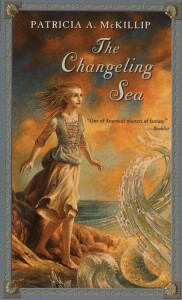 Once upon a time there was a king who fell in love with a woman of the sea. In time, however, he married one of his own people and made her his queen. In anger, the sea woman exacted a terrible price… Meanwhile, the daughter of a fisherman lost her father in the way fishermen’s families everywhere lose fathers. In anger, she cursed the sea. And so begins a story of sorrow and loss. For when the sea calls in debts, everyone pays. The king, his family, the fisherman’s daughter, her entire village. And when you curse the sea, your curse touches every shore the sea washes.
Once upon a time there was a king who fell in love with a woman of the sea. In time, however, he married one of his own people and made her his queen. In anger, the sea woman exacted a terrible price… Meanwhile, the daughter of a fisherman lost her father in the way fishermen’s families everywhere lose fathers. In anger, she cursed the sea. And so begins a story of sorrow and loss. For when the sea calls in debts, everyone pays. The king, his family, the fisherman’s daughter, her entire village. And when you curse the sea, your curse touches every shore the sea washes.
This is a pocket-sized paperback book of 137 pages. The story inside is small but potent, like a well-crafted spell. It makes perfect sense, but it’s fairy tale sense, not reasonable sense. To use a poetry metaphor, McKillip’s style isn’t like iambic quadrameter or pentameter, but rather like Gerard Manley Hopkin’s sprung rhythm. The story ebbs and flows naturally around the shapes and sounds of words and images. The ending feels right. I sense that there’s no other way for this story to end. Yet it leaves me not deeply content and satisfied, but restless. Which is a good way for a story about the sea to feel.
The characterization, as in all of McKillip’s stories, is vivid. The main protagonist, Peri the fisherman’s daughter, begins the book withdrawn, sullen and careless about her appearance (it’s a wonderful play on words that “peri” can mean “a beautiful and graceful girl”). Even as she becomes involved in the lives of the other characters in the story and comes to care for them, she never loses her ferocity of intent.
As I said before (in my review of the Firebirds anthology), “McKillip must have inherited (or found) George MacDonald’s grammarie: she excels, as did he, at portraying Faerie as a place not just beautiful, or dangerous, or intoxicating, but other. Her fey are indeed beautiful, and I long for them. But most of all, I realize how completely fey — not human — they are. Their motivations aren’t mine, aren’t those of anyone I’ve ever encountered.”
This sense of otherness is present once again in The Changeling Sea. The sea woman appears like the sea: huge, inscrutable, wistful, capable of vast calm and frightening violence. But the sea-dragon who becomes a boy shows even more skill on McKillip’s part. He begins as a sea creature entirely, just as other as the sea woman. Over time, he must learn to think, speak and act like a human. Convincingly, he never completely achieves this task.
Lyo, the magician, is the most delightful character in the story. Peri’s village has become entranced — literally — by the chain of gold that holds the sea-dragon captive in their harbor. They fantasize about the gold, plot ways to get it, dream about the wealth it could bring them. One day, a smiling magician shows up and offers to help them. His motive? “Lyo said cheerfully, ‘Simple greed. I like gold. Take it or leave it.’ ” So they row him out to the sea-dragon and wait in breathless excitement for him to work his magic. He touches the chain… and it vanishes into thin air, and so does Lyo. ” ‘Oops,’ was all the magician said about it before he vanished. ‘Sorry.’ ” Even at this point in the narrative, before Lyo appears again further along and helps Peri discover her true heart’s desire, we laugh heartily and sense that, somehow, Lyo isn’t sorry at all.
In the end, it’s Lyo’s trickster magic that pulls together the best intentions of all the characters and effects the transformations that allow them to climb out of the nets of lies and anger that have trapped them. Nobody gets everything they want, not even the sea. Do they live happily ever after? From time out of mind, people have taken boats out onto the sea. Sometimes they return. Sometimes they don’t. There’s no way to be certain.
(Atheneum, 1988; Firebird, 2003)
Patricia A. McKillip’s website is here. There is a good bibliography of McKillip’s writing at Fantastic Fiction.
